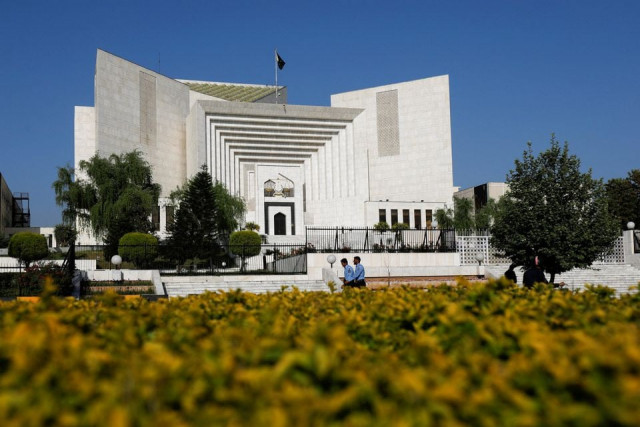SC to issue ruling on election date today
Five-judge larger bench concludes two-day hearing

A five-judge larger bench of the Supreme Court will give its judgment on the issue of the announcement of the date of elections of the Punjab and Khyber-Pakhtunkhwa (K-P) assemblies on Wednesday (today).
The bench led by Chief Justice of Pakistan Umar Ata Bandial concluded the two-day long proceedings in the case on Tuesday. Concluding the hearing, the chief justice announced that the verdict would be announced before 11am Wednesday (today).
During the hearing, the chief justice said that they were not there to support any side but to support the Constitution. "We cannot abandon the Constitution," he said, adding that they could not override the Constitution.
Sitting on the bench, Justice Mansoor Ali Shah suggested both sides to evolve a consensus on the date of the elections. However, Pakistan Tehreek-e-Insaf (PTI) leader Fawad Chaudhry said that it could become a precedent to delay the elections beyond 90 days.
Pakistan Peoples Party (PPP) counsel Farooq H Naek said that it was not the mandate of political parties to give the election date. Mansoor Awan, the counsel for the Pakistan Muslim League-Nawaz (PML-N) endorsed Naek's stance on the matter.
Awan stated in his arguments that the Supreme Court, while exercising the jurisdiction under Article 184(3) of the Constitution [which relates to the matters of public importance] could not overturn the Lahore High Court (LHC) order.
Regarding enforcement of Article 224 [which is about the time of election], the counsel said that if the elections were held in two provinces and the governments were formed, how free and fair National Assembly elections could be held amid their working.
Chief Justice Bandial said that even if the court gave its decision on the matter of elections dates, “the litigation will continue and it will become very costly for the people and political parties”.
Also sitting on the bench, Justice Munib Akhtar questioned as to who would advise the president if the assembly had completed its terms. He stated that in case the assembly had completed its term, elections must be held in two months.
According to the judge, the president could return the advice summary but in that case, 25 days would have been wasted. The bench also wondered that the Peshawar High Court (PHC) took two weeks to give a notice, while a case was still pending before the LHC.
Justice Jamal Khan Mandokhail, another member of the bench, said that the president and the governor were bound by the advice of the cabinet, but raised the question if the president and the governors could give the date of the election on their own.
The chief justice said that the governor was not bound by anyone's advice on appointing the caretaker government and the date of the election. “Where there is discretionary authority, there is no need for advice,” said Justice Muhammad Ali Mazhar.
When asked by the chief justice as to who notified the dissolution of the assembly, Supreme Court Bar Association (SCBA) President Abid Zuberi stated that the notification of the dissolution of the Punjab Assembly was issued by the law secretary.
Justice Mandokhail maintained that Article 48 of the Constitution stated that every act and action of the president shall be on the recommendation of the government. He asked if the government or the previous regime would call for the election announcement. Chief Justice Bandial said that accordingly, the date of the election will be given with advice.
Zuberi stated that there were four methods of dissolution of the assembly in the Constitution. According to the Article 112, he said, the government could end on a no-confidence motion or within 48 hours.
Justice Munib Akhtar said that the caretaker government was formed seven days after the dissolution of the assembly. He added that it was necessary to harmonise various clauses of the Constitution. “A caretaker government came to Punjab on January 22. The authority of the caretaker government is to run daily affairs,” Zuberi explained.
Justice Mandokhail said that according to the Constitution, even today the government could ask the governor to announce the date for elections. Justice Shah questioned how could the governor refuse the advice if it came for the government’s dates.
Justice Akhtar said that the 90-day time for holding the election began with the dissolution of the assembly and asked why time was being wasted after the dissolution of the provincial legislature.
Justice Shah asked if the caretaker chief minister could advise the governor to give the date of the election and if the governor could reject the advice of the caretaker government.
Zuberi stated that the election date and supervisory setup were announced together and that the authority to provide the date of the election belonged to the governor and not the caretaker chief minister.
Justice Mazhar maintained that the Constitution was clear that the governor would announce the election date when the assembly was dissolved and that the governor's authority to give the date was different from other usual factors.
Justice Mandokhail questioned if there was a restriction on the caretaker government that barred it from asking the governor to propose a date. He further asked if the summary could not be sent to the governor.
Zuberi told the bench that the Constitution detailed that the elections were to be held in 90 days and questioned what the caretaker government could do if it had not given any advice yet.
Continuing, he added that the president was given certain powers by the Constitution and the Elections Act, and under the Election Act he could give a date for the elections after consulting the Election Commission of Pakistan (ECP).
To a query from Chief Justice Bandial as to whom the governor must consult for announcing the election date, Zuberi replied that the consultation could only be held with the ECP.
Justice Mazhar pointed out that the governor had said he did not dissolve the assembly. Zuberi said the mentioning of giving an election date was only in the Article 105 (3) of the Constitution.
Justice Mandokhail said there was no restriction on giving the date for the election of the government. To this, Zuberi stated that the election had not been announced for several days.
The chief justice questioned if the SCBA president was claiming that the incumbent government was not fulfilling its constitutional responsibility. He added that conducting elections in 90 days was the spirit of the Constitution.
Zuberi stated that if the provincial assembly was dissolved under pressure of time, the president could give an election date. Giving his opinion, Zuberi said that announcing the poll dates was the authority of the president of the country.
“If the Election Commission shows incapacity to conduct elections, is the governor still bound to give the date,” Justice Shah questioned. Zuberi replied that the governor was bound to give the date in every case. Justice Mazhar said the governor would give the date, keeping in mind the decisions of the Election Commission.
“Can the president take any decision without the advice of the cabinet?” Justice Shah asked. Justice Mandokhail maintained that the powers of the president were clear in the Constitution and that he was bound by the advice.
Zuberi stated that the president was not obliged to give advice for everything and could exercise every power given to him under the law. “The president and the governor are only bound to consult the ECP,” Zuberi added. Justice Shah stated that the president, as head of the state, could take decisions only on advice.
When asked if the duration of the election campaign could be reduced, the advocate for the ECP stated that time was required for printing ballot papers and that the duration of the election campaign could be up to two weeks.
Justice Akhtar maintained that it was more important to follow the Constitution. However, the attorney general for Pakistan (AGP) reminded the court that the 2008 elections were also held after the stipulated time period.
Justice Mandokhail said the first question was who would announce the date of the elections and that the process would start after the ECP recommended a date. He added that the hearing would not have taken place if the Constitution clarified responsibility on the matter of announcing the date for elections.
The chief justice said that the authority of the Election Act could not be higher than that of the Constitution, while the authority of the president could not be inconsistent with the Election Commission.
Sujeel Shehryar Swati, the lawyer for the ECP, maintained that the ECP could announce the date of by-elections, but added that according to the Constitution, the governor should provide the date of the provincial elections. “The Election Commission operates according to the Constitution and the law,” Swati said.
The K-P governor's counsel said that if the governor dissolved the assembly, he was authorised to give the date. Justice Mazhar maintained the governor did not write anywhere in the letter that the date for the polls would not be provided.
He said that the governor of K-P dissolved the assembly on the advice of the chief minister and that the ECP asked the governor to refer to the provincial government on February 3. “In the letter, the Election Commission also mentioned its difficulties.”
Chief Justice Bandial said that the election date could only be determined with ground realities. He reiterated the need for setting an election date and added that obstacles could be removed after the date was announced.
The chief justice advised that the apex court could be approached in case of any problem. “Paralysing the system is not allowed under the Constitution,” he said. He added that the elections must be held and that the first priority was to follow the Constitution.
The counsel maintained that the K-P governor refused to give election dates. He said that the date of the dissolution of the assembly could not be given on the summary of the chief minister. It was the responsibility of the ECP to fix the date, he said, supporting the AGP's stance.
Justice Mazhar questioned that if the assembly was dissolved, and a caretaker government was formed, why did K-P governor not announce the date.



















COMMENTS
Comments are moderated and generally will be posted if they are on-topic and not abusive.
For more information, please see our Comments FAQ